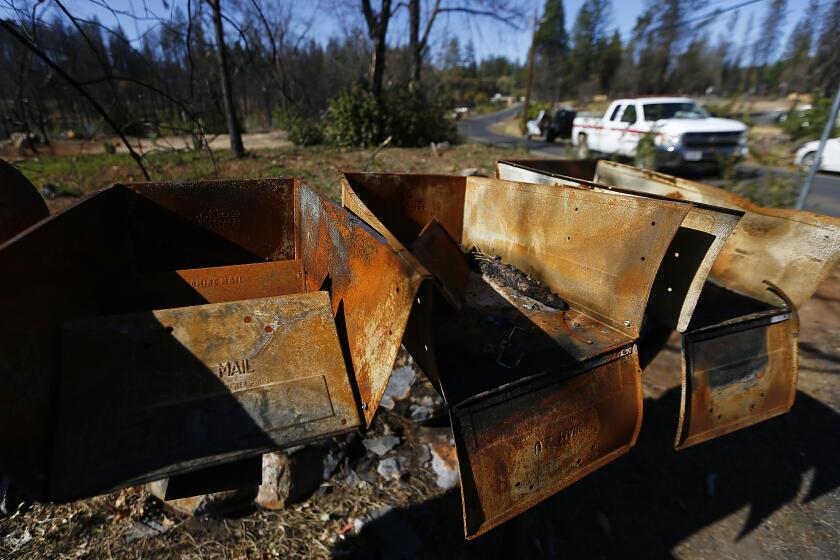California attorney general subpoenas oil refiners in gas-price probe
State Atty. Gen. Kamala Harris has issued subpoenas to oil refiners as part of an investigation into unusually high gasoline prices in California during the last year.
California drivers paid pump prices that have been as much as $1.50 higher than the rest of the nation since last summer.
Gordon Schremp, senior fuels analyst for the California Energy Commission, said he was aware of Harris’ investigation of the state’s refiners. He said the attorney general’s office has requested significant information dating back to 2015 on the oil refineries, their imports and exports.
Kristin Ford, a spokeswoman for Harris’ office, said she could neither confirm nor deny whether the agency is investigating the refineries; news of the probe was first reported Thursday by the Wall Street Journal.
Harris is running against Rep. Loretta Sanchez for the seat of retiring Sen. Barbara Boxer.
An advisory panel to the California Energy Commission has been reviewing gas prices over the last several months to determine what, if anything, lawmakers might consider to ensure that consumers aren’t being gouged at gas stations.
The most recent surge in California fuel prices was largely driven by the outage at the Exxon Mobil Torrance refinery, which resulted from an explosion in February 2015, Schremp said.
During the Torrance outage, California refiners reaped record net income, even as gasoline prices were falling elsewhere in the country. Beyond the Torrance outage, critics of the oil companies blamed manipulation of the gasoline market for exacerbating the price increase.
“There have been all kinds of major allegations,” Schremp said. “I’ve seen [attorney general investigations] with all kinds of price spikes. I don’t know of an incidence where they’ve come back and said, yes we’ve found manipulation in the gasoline market.”
Catherine Reheis-Boyd, president of the Western States Petroleum Assn., said in a statement that the oil refineries will cooperate fully with any federal and state inquiries into California’s gas prices, and that her organization believes its members did nothing wrong.
“The petroleum industry is one of the most heavily regulated and closely monitored industries nationwide,” Reheis-Boyd said. “Over the past several decades, numerous investigations and expert market analysis have found no evidence of illegal activities or violation of anti-trust laws. I expect the conclusion will be consistent with past findings: market factors are the primary driver of fuel costs in California.”
Jamie Court, president of the advocacy group Consumer Watchdog, praised the move. Court has been pressing for an investigation since gasoline prices began to jump last summer.
SIGN UP for the free California Inc. business newsletter »
“We finally have an official legal inquiry on the way,” Court said. “It’s going to result in answers that we should have had a long time ago.”
Court’s said his questions include why an Exxon Mobil ship was not used to deliver gasoline to California as inventories depleted as the Torrance refinery’s production level dropped below 20%.
The Torrance refinery accounts for 10% of the state’s refined-gasoline capacity, and 20% of the capacity in Southern California.
Production levels plummeted after the February explosion destroyed a pollution control system at the plant.
Exxon Mobil, which is selling the Torrance plant to New Jersey-based PBF Energy, worked to bring the facility back online for almost a year and a half. Repairs have been completed and the sale to PBF Energy is expected to be completed Friday.
Court said he believes the oil refiners used Torrance’s troubles to manipulate gas prices and limit gasoline supply in the market.
I do think the SR American Progress was the poster child for the problem.
— Jamie Court, president of Consumer Watchdog
One piece of evidence for that belief, he said, was the fact that Exxon Mobil had a ship, the SR American Progress, sitting off the coast of the Singapore for 70 days instead of using it to bring gasoline to the California market.
Singapore has refineries that produce California’s special blend of environmentally friendly gas.
“I do think the SR American Progress was the poster child for the problem,” Court said.
Exxon Mobil has disputed Court’s allegation about the ship, and a refiner trade group representative previously denied any market manipulation by state refiners.
Todd Spitler, an Exxon Mobil spokesman, on Thursday declined to discuss whether the company had received a subpoena from Harris’ office.
Gas prices in California typically run higher than the rest of the country due to higher-than-average taxes and fees, requirements to produce special low-pollution blends and the relatively small number of refineries in the state.
But last summer the gap between the Los Angeles area prices and the rest of the country set records.
For instance, California refineries reaped an average of 49.3 cents on a gallon of gasoline from 1999 to 2014, according to the California Energy Commission. But in summer 2015, the average ballooned to 88.8 cents, triggered when the refinery troubles in February of that year disabled 7% of the state’s capacity at a time of low inventories.
Gas prices remain higher than expected, about 68 cents higher in the L.A. area than the rest of the nation.
Schremp said the price gap is due to other recent refinery outages, most of which have been short-lived.
For more energy news, follow Ivan Penn on Twitter: @ivanlpenn
MORE BUSINESS NEWS
Historic theaters gain new life as retail stores
Behind shrinking middle-class jobs: A surge in outsourcing
Don’t drive these Hondas and Acuras unless dangerous air bags are fixed, government warns
UPDATES:
1:45 p.m.: This article has been updated with comments from Catherine Reheis-Boyd, president of the Western States Petroleum Assn.
This article was originally published at 12:47 p.m.
More to Read
Inside the business of entertainment
The Wide Shot brings you news, analysis and insights on everything from streaming wars to production — and what it all means for the future.
You may occasionally receive promotional content from the Los Angeles Times.











